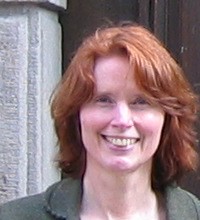We talked about smells, tastes, the feeling of touch & how these senses connect us to memories and associations that sometimes are more about words than feelings. Research in psychology has suggested that memories of events and extended periods of time can be bundled into associations with these dark senses - and a smell or a taste can evoke those memories whole - complete with all the complex feelings that don't quite have words. We spent a lot of time on fire and smoke, body smells, the smells associated with seasons and weather (rain, the air), places (the ocean or a camp site), and things (coper and blood, soup and The Price is Right).
As we talked about these senses - we speculated about the ideas they might evoke: how their interpretations/meanings change (as in Allison's story about body odors); how they tell our secrets (as in the air freshener and sex story); how they reveal things that are real and there - but which we which we might not consciously pay attention to or perceive -or that we can't name or explain (as when Alex knows he's home by the smell of the air, or Maureen's knowing that spring is here even when there are no plants and birds to testify); or what they tell us about a person's life (smoking, drinking, illness, sexual activity). Then their are bodily reactions - to vinegar, smoke, or snails - smells that make us sick not entirely because of their physical reality - but because of our associations to them => as if imagined reality is more forceful than mater itself.
You have lots of material for reflection here!
We then talked briefly about Montaigne - both as an example of the emergence of essays as a literary genre, and as a "modern" voice (like CNF). You observed that it is in the first person, that he is serious in his questioning, that he reflects and tells (though the examples are not primarily from his own experience - but rather from texts as in academic essays). We also noticed that he was intent on communicating the truth (this essay reads rather more like an argument than most contemporary CNF) rather than his or a truth.
For Orwell, it seemed as if he'd read Lott's essay. We paid attention to how he managed the movement from the story (the compelling experience that drives the writing) to his reflection.
On Monday we will think about form in some more depth.
Read: Schwartz
Blog 4: What is the overall focus of this essay? What is the focus of each section? How does Schwartz use the gaps between the sections (or really - I guess the question is what connections were you as the reader set up to make between sections)?
Have a great weekend, and see you on Monday.
Adrift Film Gratuit A Voir
4 years ago

No comments:
Post a Comment